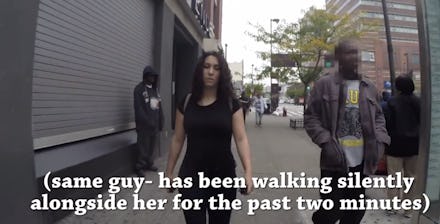Woman Exposes Disturbing Reality of Street Harassment — Here's How She Was Rewarded

Harassment breeds harassment.
New York City actress Shoshana B. Roberts documented the over 100 instances of verbal and sexual harassment she received as she spent 10 hours walking the streets of New York recently. Roberts' two-minute video was released Tuesday and immediately went viral, garnering close to 5 million views. But while women's advocates were quick to praise the investigation, it appears the activist is now being targeted online.
According to Hollaback! the nonprofit fighting to end street harassment that put out the PSA, Roberts has received multiple death and rape threats as a result of the clip.
The organization's deputy director, Debjani Roy, told Newsday that "the threats on YouTube and they're being deleted" upon being reported. His colleague, director Emily May, optimistically noted that the threats may also "indicate that we are hitting a nerve."
But how disturbingly ironic that in order to expose one kind of harassment, a woman must prepare herself for a whole new kind of gendered hate: online harassment.
What this means: Men, who were called out in the original video for their catcalling, are now harassing Roberts and her supporters in what is perhaps an attempt to discredit the project — or silence it. Both street harassment and online harassment are similar in that they both aim is to limit someone's freedom of movement. The harassers on the streets and the harassers online want to stop, contain and control Roberts and women like her. This is how patriarchy survives — by shutting down its main critics: women.
When women do fight back, the abuse can even turn deadly. This presents a very problematic paradox for activists. In order to survive, will they be forced to silence themselves and curtail their physical movement? We've already seen this happening more and more, whether it's feminist gaming critic Anita Sarkeesian going into hiding or Melissa Harris-Perry silencing her voice on Twitter in order to avoid online harassment.
Videos like Roberts' are important because they continue to put pressure on the patriarchy in real, tangible ways. But as the very swift backlash in this case proves, it's unclear how long women will be able to continue such advocacy in the face of such a concerted campaign of misogynistic harassment. Are we as a comity really OK with this? Clearly, a cultural shift needs to happen in America, and it needs to happen now.